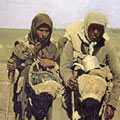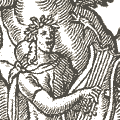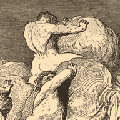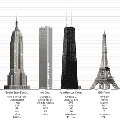 Terug in Nederland uit het klooster waar ik in 1995 het eerste deel van de Philokalia kocht, ben ik weer in deze compilatie van geestelijke geschriften aan het lezen. Inmiddels heb ik alle vier de delen die vanaf 1979 bij Faber & Faber(London) zijn uitgegeven. De Philokalia is een compilatie teksten van woestijnvaders en Byzantijnse theologen tussen de vijfde en de veertiende eeuw. De oudste is Evagrios van Pontos (345-399) en de jongste Gregorios Palamas (1296-1359) De eerste maakte aan einde van zijn leven in 392 nog mee dat het Romeinse Rijk in een westelijk en oostelijk deel gesplitst werd. De laatste leefde in dat oostelijk deel van het Romeinse Rijk, beter bekend als het Byzantijnse Rijk, dat nog tot 1453 zou blijven bestaan.
Terug in Nederland uit het klooster waar ik in 1995 het eerste deel van de Philokalia kocht, ben ik weer in deze compilatie van geestelijke geschriften aan het lezen. Inmiddels heb ik alle vier de delen die vanaf 1979 bij Faber & Faber(London) zijn uitgegeven. De Philokalia is een compilatie teksten van woestijnvaders en Byzantijnse theologen tussen de vijfde en de veertiende eeuw. De oudste is Evagrios van Pontos (345-399) en de jongste Gregorios Palamas (1296-1359) De eerste maakte aan einde van zijn leven in 392 nog mee dat het Romeinse Rijk in een westelijk en oostelijk deel gesplitst werd. De laatste leefde in dat oostelijk deel van het Romeinse Rijk, beter bekend als het Byzantijnse Rijk, dat nog tot 1453 zou blijven bestaan.
Juist de politieke scheiding in 392 is bepalend geworden voor de ontwikkeling van het Avondland in cultureel en religieus opzicht. Na het schisma in 1054 heeft zich onder aanvoering van Rome definitief een westers Christendom ontwikkeld, het Rooms-katholicisme, dat in geestelijk opzicht anders is dan het oorspronkelijke Christendom. De Orthodoxe Kerk is trouw gebleven aan de Christelijke Traditie die zich sinds Paulus over de wereld verspreid heeft. Voor ons Westerlingen hebben de teksten van de vaders uit de Philokalia een andere smaak dan de scholastiek of reformatorische theologie. De Westerse theologie is over het algemeen verstandelijk en systematisch, terwijl de theologie van de (woestijn)vaders direct uit het hart spreekt en meestal niet zo strak geordend is. Het is het verschil tussen kennis van het hoofd en kennis van het hart. De vaders laten zien dat we God vooral leren kennen door met Hem om te gaan, niet door alleen over Hem te lezen. Het lezen in de Philokalia lijkt dus wat tegenstrijdig…
Soon the Philokalia was translated into multiple languages. In 1793, a Slavonic translation done by St. Paisii Velichkovskii (1722-1794), was published at Moscow under the title Dobrotolubiye, and later reprinted in 1822. This would be the version carried by the unnamed central character in The Way of a Pilgrim and was responsible for a spiritual revival in 19th century Russia, impacting a lot of her people, including Fyodor Dostoevsky. A second translation was published in 1857 and was done by St. Ignatii Brianchaninov (1807-1867). A third one was done by St. Theophan the Recluse (1815-1894), but he included other texts not in the Greek original as well as paraphrases or omissions of other sections. This translation was published in five volumes under the auspicies of the Russian Monastery of St. Panteleimon at Mount Athos in 1877. A Romanian translation first appeared in 1946 with Fr. Dumitru Staniloae presiding as editor (the fifth volume appeared in 1976 and it’s expected to be eight volumes). A French translation is currently in the works. Both of these use the Greek.
Bron: orthodoxwiki.org
Deel 1
St. Isaiah the Solitary (circa 400-491)
Evagrius the Solitary (345-399)
St. John Cassian (circa 360-435)
St. Mark the Ascetic (omstreeks 500)
St. Hesychios the Priest (8e-9e eeuw?)
St. Neilos the Ascetic (5e eeuw)
St. Diadochos of Photiki (circa 400-485)
St. John of Karpathos (7e eeuw?)Deel 2
St. Theodoros the Great Ascetic (7e-9e eeuw?)
St. Maximos the Confessor (580-662)
Thalassios the Libyan (7e eeuw)
St. John of Damascus (675-749)
St. Theognostos (8e – 24e eeuw?)Deel 3
St. Philotheos of Sinai (9e-10e eeuw?)
Ilias the Presbyter (omstreeks 1100)
Theophanis the Monk (?)
St. Peter of Damascus (11e-12e eeuw?)
St. Symeon Metaphrastis (Deze tekst blijkt van Makarios te zijn, circa 300-390)Deel 4
St. Symeon the New Theologian (949-1022)
Nikitas Stithatos (circa 1000-1076)
Theoliptos of Philadelphia (circa 1250-1322)
Nikiphoros the Monk (13e eeuw)
St. Gregory of Sinai (circa 1265-1346)
St. Gregory Palamas (1296-1359)Bron: orthodoxwiki.org
Van de vetgedrukte woestijnvaders en theologen wil ik de komende weken een aantal teksten gaan citeren.













